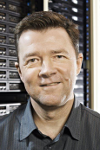Invited Speakers
Brenda DietrichIBM T. J. Watson Research Center |
|
 |
Data Analytics Opportunities in a Smarter PlanetAbstract New applications of computing are being enabled by instrumentation of physical entities, aggregation of data, and the analysis of the data. The resulting integration of information and control permits efficient and effective management of complex man-made systems. Examples include transportation systems, buildings, electrical grids, health care systems, governments, and supply chains. Achieving this vision requires extensive data integration and analysis, over diverse, rapidly changing, and often uncertain data. There are many challenges, requiring both new data management techniques as well as new mathematics, forcing new collaborations as the basis of the new "Data Science". Needs and opportunities will be discussed in the context of specific pilots and projects. Brenda Dietrich is an IBM Fellow, Vice President and Chief Technology Officer for Business Analytics in IBM. She provides technical guidance for IBM's Business Analytics software strategy and products, and provides leadership for the analytics software community within IBM. Previously she led IBM's research activities in Business Analytics and Mathematical Sciences, and supports software products and consulting in these areas. She was responsible for both basic research in computational mathematics and related fields, and the development of novel business applications based on the application of mathematical models within industry. She has been the president of INFORMS, the worlds largest professional society for Operations Research and Management Sciences, and is an INFORMS Fellow. She serves on the Board of Trustees of SIAM. She has served on university advisory boards for Northwestern, CMU, MIT, and UC Berkeley, and on advisory boards for NSF sponsored Math Research Institutes. She holds more than a dozen patents, has co-authored numerous publications, and co-edited the book Mathematics of the Internet: E-Auction and Markets. She holds a BS in Mathematics from UNC and an MS and Ph.D. in OR/IE from Cornell. Her personal research includes manufacturing scheduling, services resource management, transportation logistics, integer programming, and combinatorial duality. |
Christian S. JensenAarhus University |
|
 |
Data Management on the Spatial WebAbstract Due in part to the increasing mobile use of the web and the proliferation of geo-positioning, the web is fast acquiring a significant spatial aspect. Content and users are being augmented with locations that are used increasingly by location-based services. Studies suggest that each week, several billion web queries are issued that have local intent and target spatial web objects. These are points of interest with a web presence, and they thus have locations as well as textual descriptions. This development has given prominence to spatial web data management, an area ripe with new and exciting opportunities and challenges. The research community has embarked on inventing and supporting new query functionality for the spatial web. Different kinds of spatial web queries return objects that are near a location argument and are relevant to a text argument. To support such queries, it is important to be able to rank objects according to their relevance to a query. And it is important to be able to process the queries with low latency. The talk offers an overview of key aspects of the spatial web. Based on recent results obtained by the speaker and his colleagues, the talk explores new query functionality enabled by the setting. Further, the talk offers insight into the data management techniques capable of supporting such functionality. Christian S. Jensen is a Professor of Computer Science at Aarhus University, Denmark, and he was previously at Aalborg University for two decades. He recently spent a 1-year sabbatical at Google Inc., Mountain View. His research concerns data management and data-intensive systems, and its focus is on temporal and spatio-temporal data management. Christian is an ACM and an IEEE fellow, and he is a member of the Royal Danish Academy of Sciences and Letters and the Danish Academy of Technical Sciences. He has received several national and international awards for his research. He is currently vice-chair of ACM SIGMOD and an editor-in-chief of The VLDB Journal. |
Kenan SahinTIAX |
|
 |
Challenges in economic massive content storage and management (MCSAM) in the era of
|
